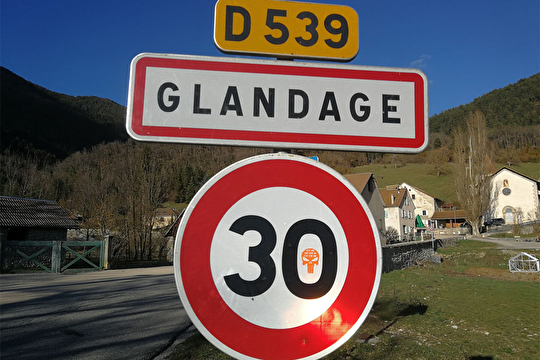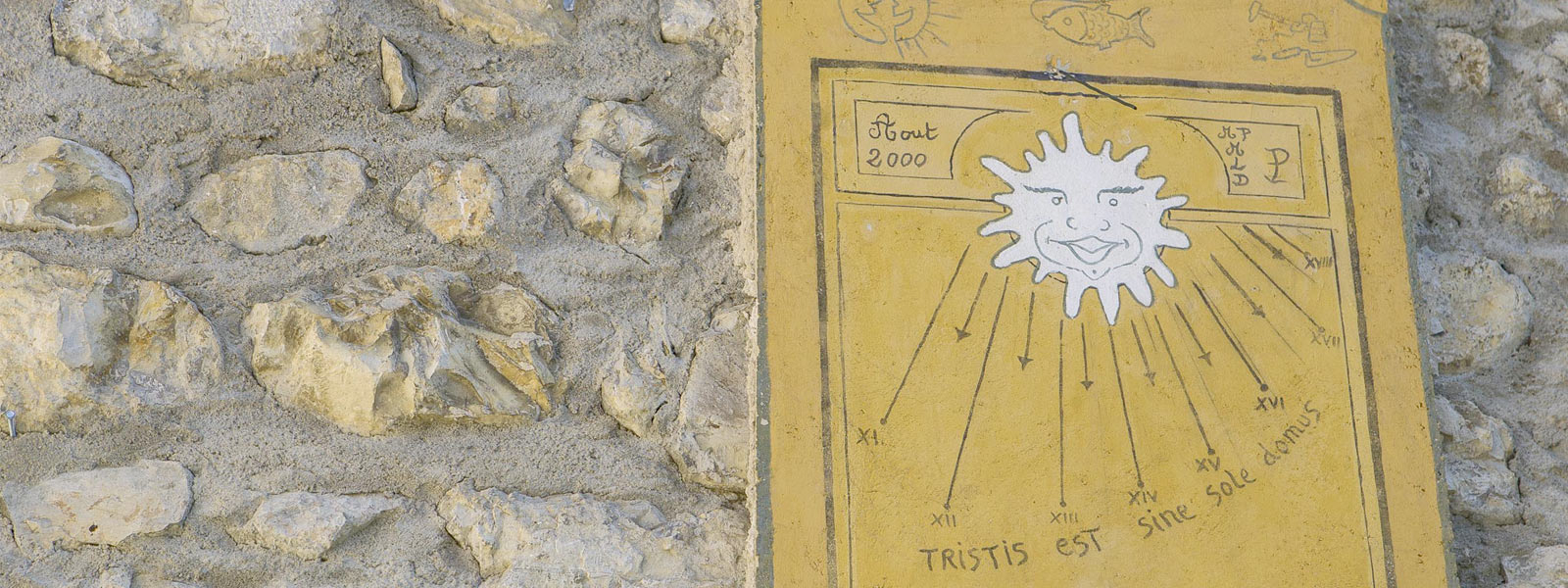Glandage
What do you think is the favourite activity in this village? [pun on picking acorns/wasting time]This isolated village has come to prominence on social media due to the village sign as you arrive and I will let you guess why!
But the reality is that acorns (glands) were collected here. In fact,the ‘glandage’ was the right of pasture beneath the oak trees under the feudal system.

In Die
People say: a storm over the Glandasse will pass on, but over Justin – beware!
Every corner of France has its little weather forecasting rhyme, which is very useful for people who don’t know the area.
So, for those of you who really don’t know the Diois, the mountains of Glandasse and Justin are, respectively, North and South of the town of Die.

At the Vente-cul col
You can know what to expect on a windy day!Your walking day looks like a bright one and you decide to walk up to the top of the Jocou, dominating the four landscapes of the Haut Diois, the Trièves, the Vercors and the Dévoluy, but the clouds are rushing across the sky.
So here is some advice: turn back if you are worried about your hair style, the wind will create havoc up there.

Where the Bez and the Drôme meet
Libido guaranteed on the pebbles!Even when it’s hot in the Pays Diois, the confluence of these two rivers makes us laugh – not the best way to meet someone, though you never know [play on bez = baiser, to make love].
In fact, the word Bez is supposed to come from the Celtic ‘bezv’ which means source. Not quite so funny.

Back in Die again
Ça te DIt sameDI un petit tour à DIe dans mon paraDIs ? [untranslatable !]It’s market day in Die! Let’s take advantage of the fact and take on the role of the ‘cigale et la fourmi!’ [poem by La Fontaine]
Make the most of short supply chains by buying from local producers, rather than just dallying at their stalls, have a café on the terrace and with a bit of luck there will always be a passing musician to get everyone in the mood.

Being at Poyols
Low spend holidays guaranteed!In the South being « payolle » means being broke. And it’s true that in the Pays Diois one can have a holiday without spending too much and just enjoy the wonderful air.
There’s the river, nature, sport and many little villages such as Poyols, where you won’t be bothered by consumer society.

Whilst walking
Don’t go to sleep on the Col du Charnier, or you will fall prey to the vultures! [play on charnier = charnel as in charnel house]That’s right, vultures are scavangers.
So if, after the stiff climb up to up to the Lauzon lake, and the steep ascent to the Charnier, you are exhausted and attempt to recover by lying on the yielding grass, in the sun, in total silence – there’s a good chance you will doze off and they will have a peck at you!

Still in Die
Don’t urinate in the « Placette du pipi contre les murs » !Far from wishing to encourage this practice, which makes a mockery of the fragrance of Provence around the Saint-Marcel gate, this description and the commemorative plaque to the old toilets, demand a pressing need for a consciousness raising exercise.
So, gentlemen, do what the ladies do and make for the public toilets in the Meyrosse car park or on the Place de la Comtesse.

Du côté d'Archiane
Drink a ‘tisane’ at the Jardin du Roy, it’s not what you think !Yes indeed, there are no wonderful formal gardens or high-flying receptions at the Jardin du Roy, just a regal landscape above the old Treschenu-Creyers (now part of Châtillon-en-Diois).
A long climb, following the cairns, opens out onto the ‘Réserve Naturelle des Hauts Plateaux du Vercors’ with its sheep barn, summer pasture, mountain hook pines, vultures and a well-deserved tisane from your thermos flask.

At Saint-Nazaire-le-Désert
A short stop at the Petit Paris chapel and the Petit Père Lachaise cemeteryYes, Saint-Nazaire-le-Désert seems to be a large enough village but with lots of ‘little’ references!
The name of the cemetery is a simple play on words and in fact the Petit-Paris has nothing to do with the French capital. The name of this place which is no longer a commune, is more likely to come, like « petit Nice », from the Celtic « para » which means places well exposed to the sun.
This site is good to know for a little spring walk, since the view from in front of the chapel is outstanding!



